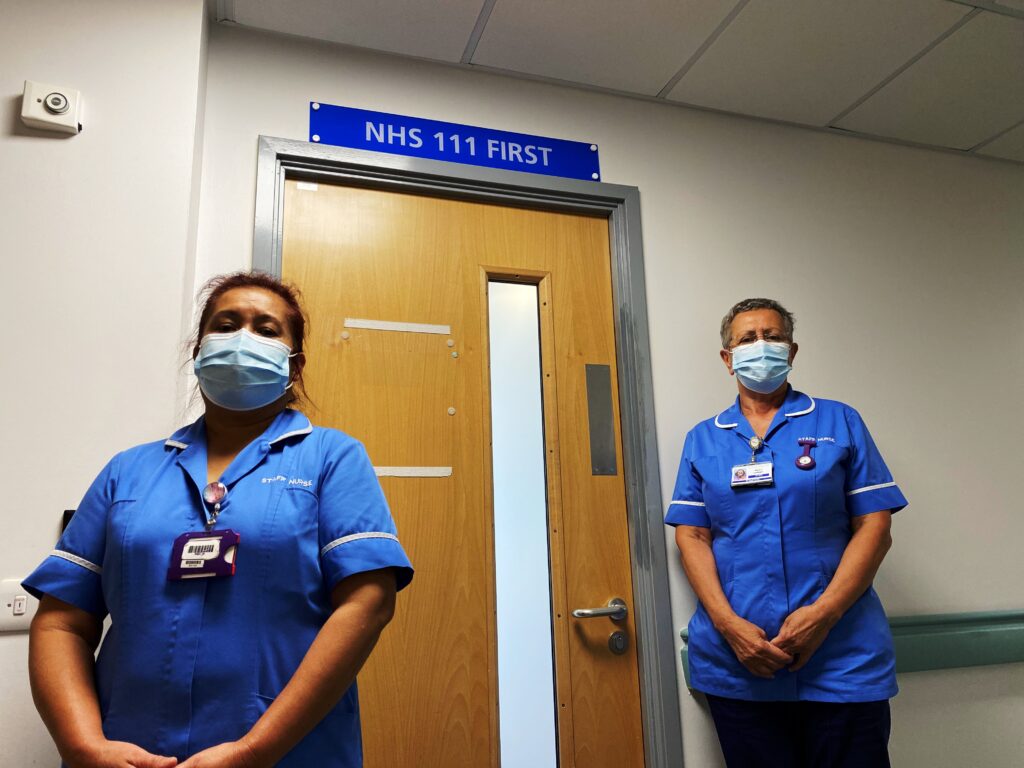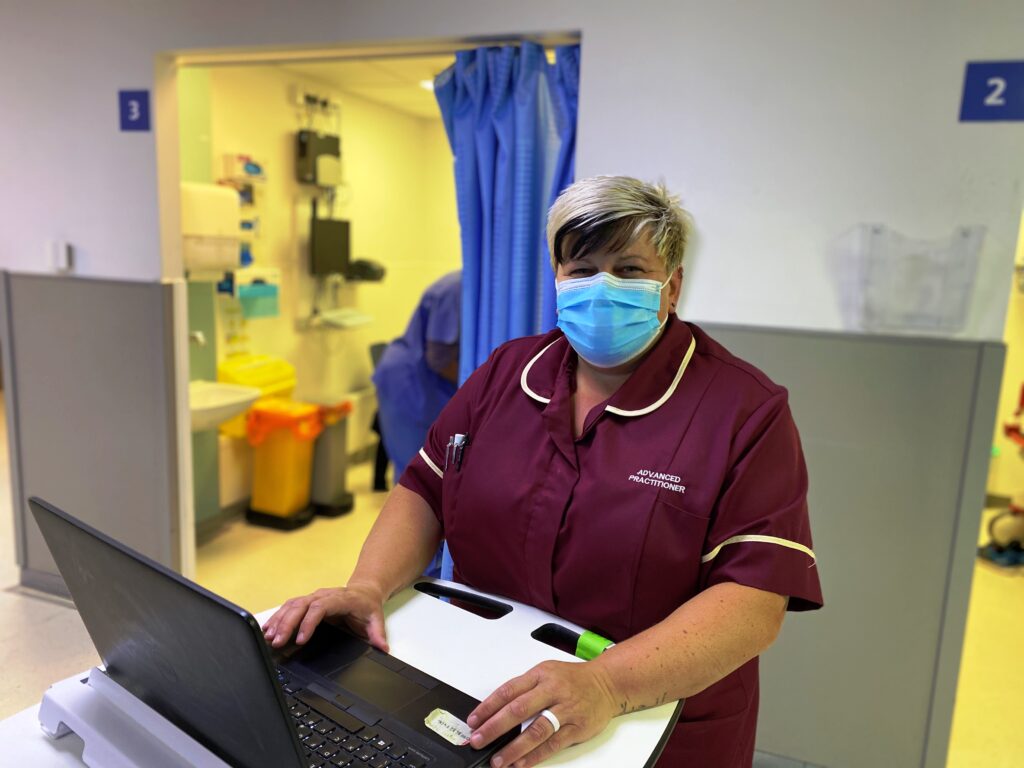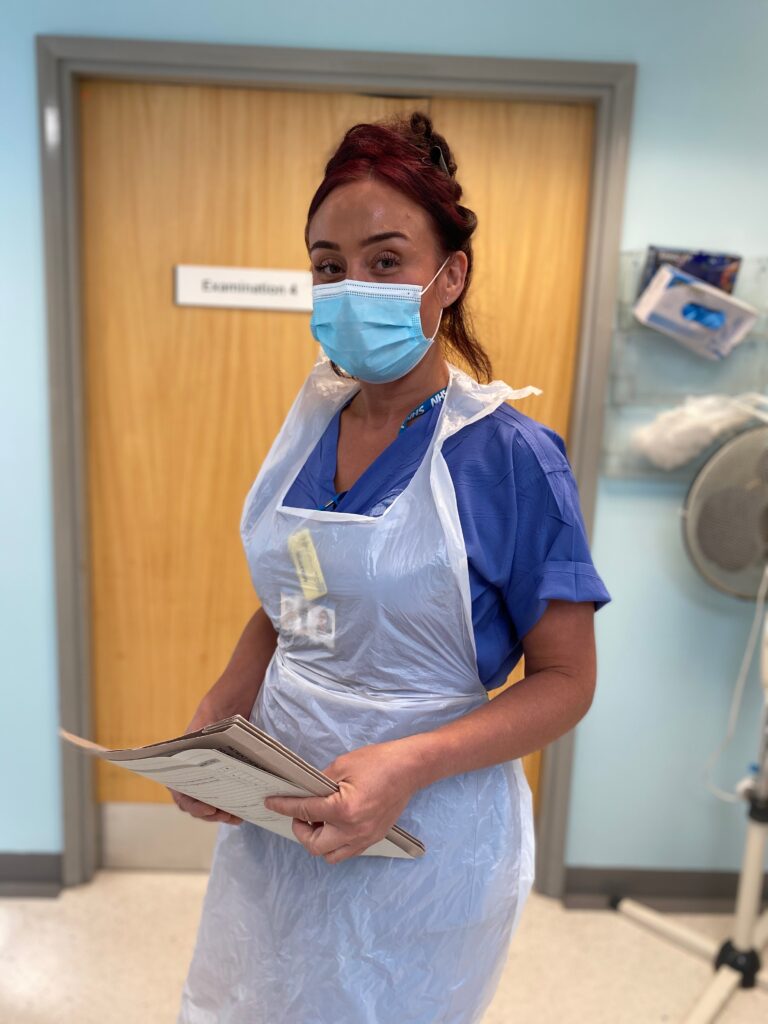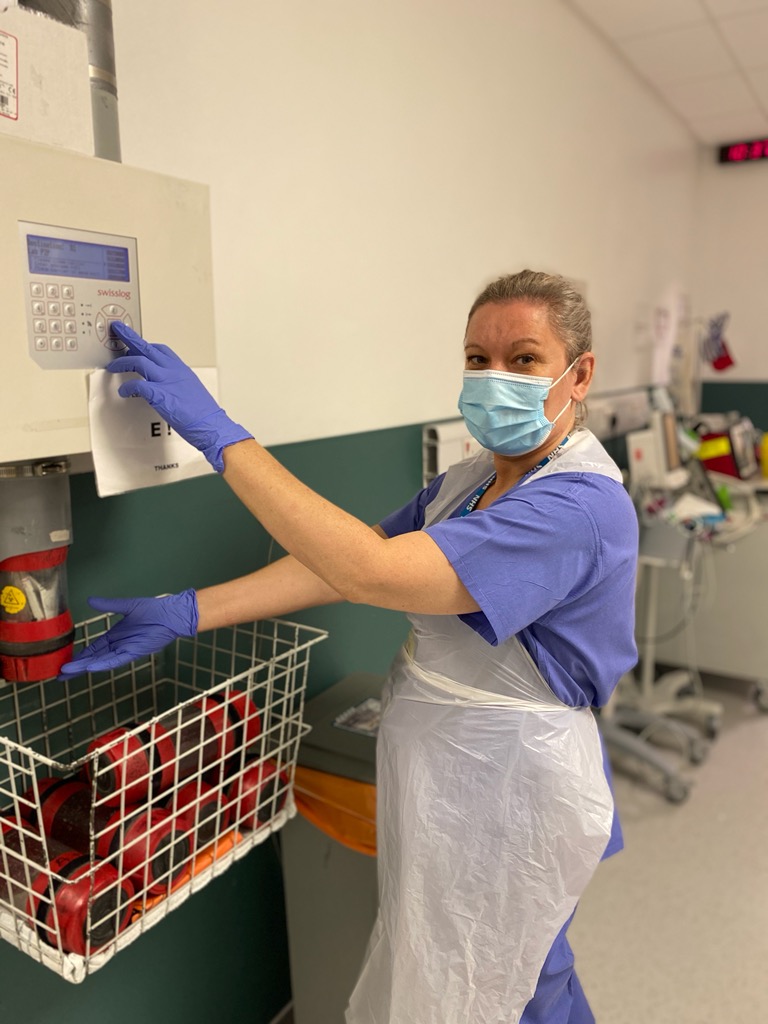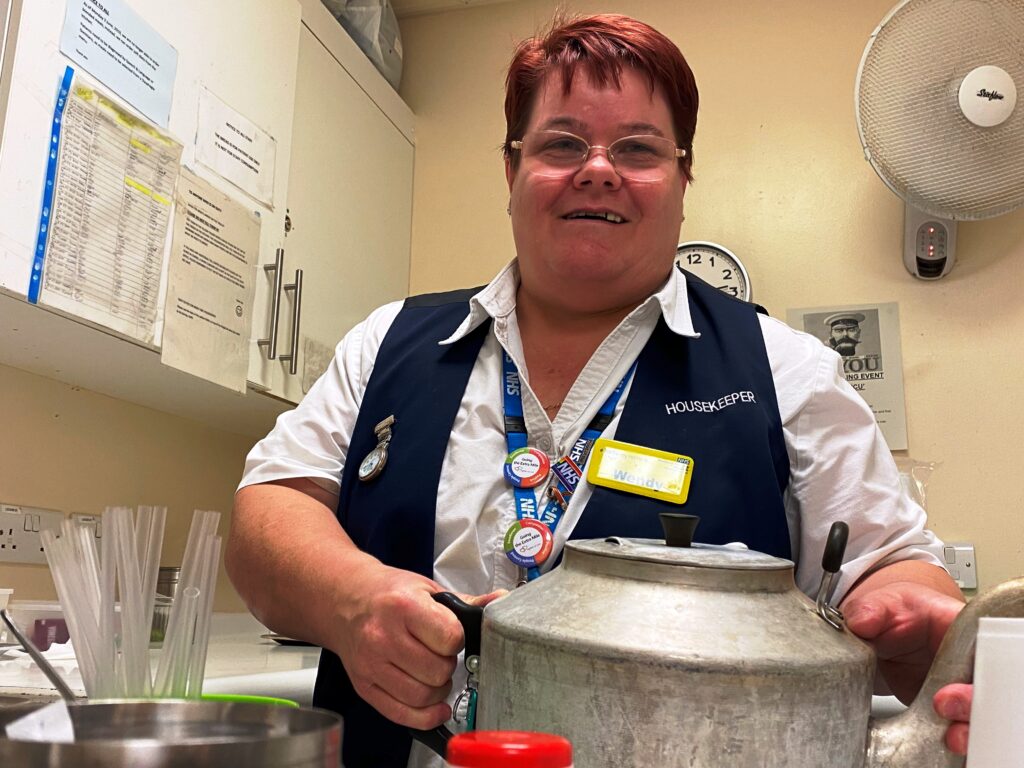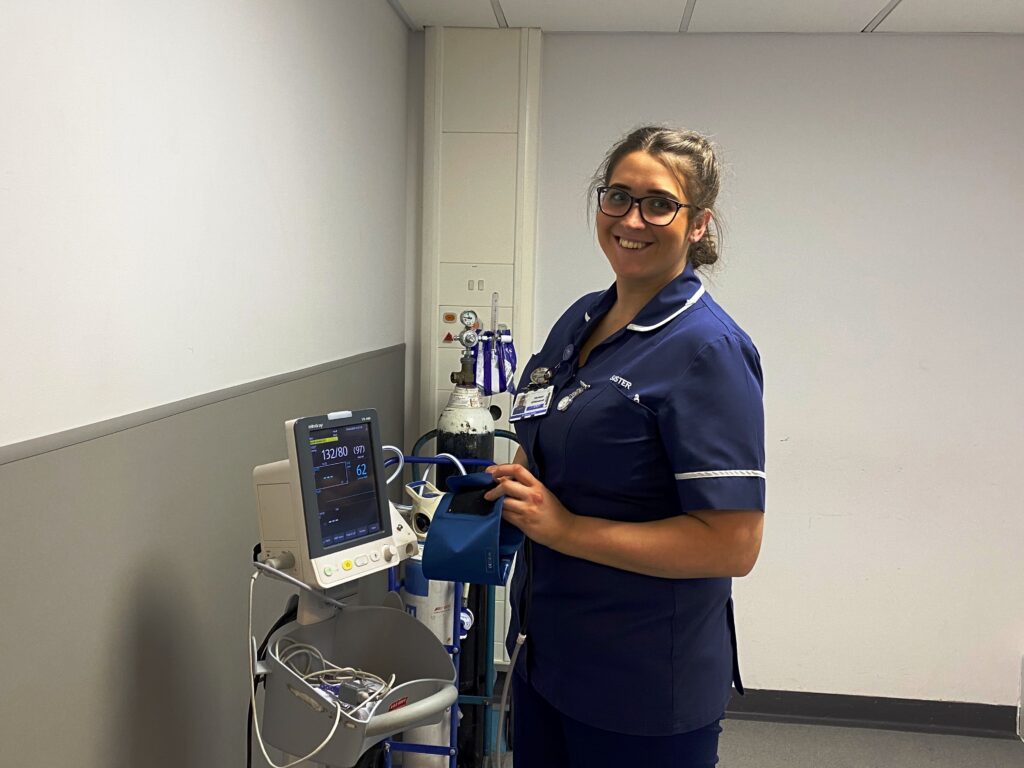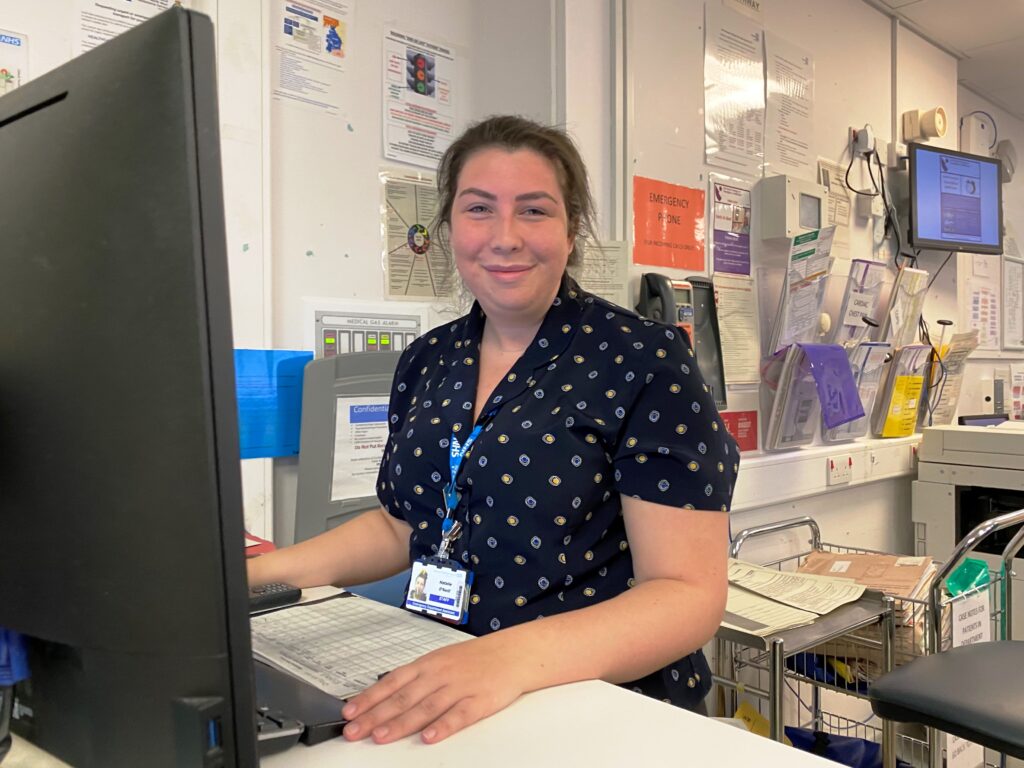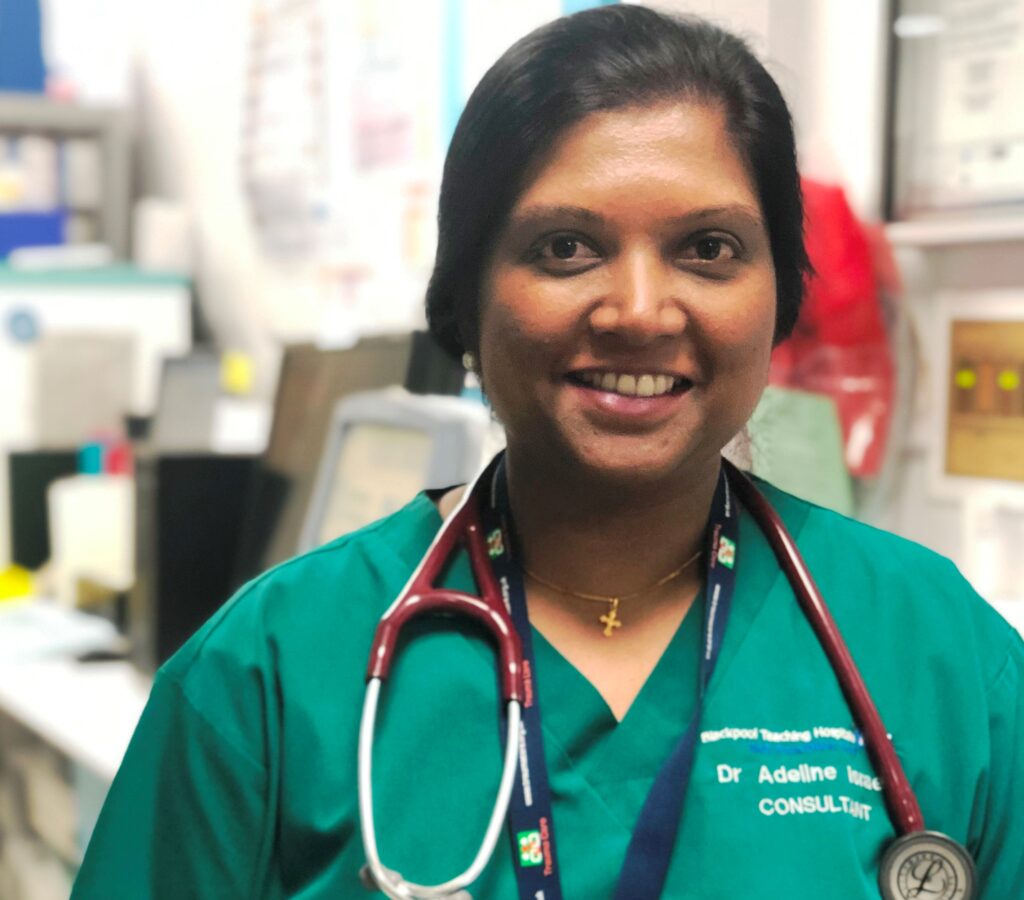ED Voices: Sarah completes first year as a qualified ED nurse
Sarah Yarnell was working as a nanny when she felt the call to nursing.
The 27 year-old from Blackpool had worked all over the world, but realised when working with children with additional needs that she wanted to nurse and returned to education to study a nursing degree.
Having qualified in March 2019 from Liverpool John Moores University, she has now completed her first year as a newly qualified nurse in the Emergency Department (ED) at Blackpool Victoria Hospital.
Sarah said: “I knew I wanted to be a nurse in emergency medicine. Throughout my training, I didn’t do a placement in ED, yet as soon as I qualified, I applied to work here at Blackpool, so I was new to the Trust, new to ED and new to nursing.”
Sarah was understandably nervous in her first week in the Emergency Department. She said: “I was used to hospitals in Liverpool so it was a bit daunting to work in my home town as it was so different. However, I felt so welcomed. It is a big team, but I had lots of support and training and soon felt part of the ED family.”
A typical day on shift is varied. One moment Sarah can be attending to patients with minor injuries and the next assisting in life-threatening emergencies. It’s the variety within the working day that keeps Sarah in the emergency medicine specialty.
She added: “I’m really happy here and have made some good friends. The team is great – everyone works together and supports each other. We have a staff Facebook group and after particularly busy or stressful shifts, staff will often post messages to thank us for our hard work, it really helps to boost morale.”
“The Emergency Village will be a fantastic development for both staff and patients with better space to work in and better joined up care. It will be great to see further collaborative working. I can’t see myself working anywhere else.”
In the last of her video in the series, Dr Israel explains the ongoing changes in and around the Emergency Department and the advises the best way to access emergency care:
ED Voices: Meet the some of the new NHS 111 First team
As people on the Fylde coast who need NHS care are being asked to call NHS 111 before they decide to visit A&E, Blackpool’s Emergency Department has created a new team.
Evelyn Gudoy and Dawn Latham are two of the experienced nurses who work within the NHS 111 First service. They triage the people who have been booked an appointment from NHS 111 and who are guaranteed to be seen within 30 minutes.
Evelyn has been a staff nurse in the Emergency Department for 19 years.
She said: “Through the booking system, we can see when appointments have been made by NHS 111. We are here to meet the patient and to triage them in order to direct them to the most appropriate service, depending on their condition.”
Dawn, who has worked in the Emergency Department for 28 years said: “The good thing about this service is that people are seen in time order so they are not necessarily waiting around as they may sometimes have to in ED. We have four appointments and hour and so it is a much quicker process to be seen and referred to the correct service if appropriate.”
Evelyn, originally from the Philippines, worked as a nurse in Saudi Arabia for nine years before coming to Blackpool with her husband, who is also a nurse.
She said: “Working in ED can be stressful sometimes, but the teamwork is amazing – there is always support if you need it. I love my job because I get a lot of satisfaction in being able to care and help people. It’s a great feeling to know you have made such a difference to someone.”
Dawn came to nursing at 38 years-old after writing to five of Blackpool Victoria’s departments, stating that she wanted a job with more meaning.
She said: “A&E replied to me with a provisional interview, so I went along and was appointed as an auxiliary on the Bench. Eventually, after a lot of persuading from the department, I completed my nursing diploma to become a registered nurse.
“Emergency nursing is so rewarding and every day is so different. I would not still be here after 28 years if it was boring. It’s very rewarding to make your patients comfortable and guiding them through treatment. Nursing is definitely a calling.”
Both Evelyn and Dawn are looking forward to the completed Emergency Village. Evelyn said: “Once it is finished, it is going to be amazing for patients and staff.”
The Fylde coast is the first region in the North West to implement the new nation-wide NHS 111 First system.
Other areas across the region will start to introduce the new system through the autumn. NHS 111 First is set to be rolled out nationally by December.
Here, Emergency Department Lead for The Emergency Village and Critical Care development, Dr Israel, discusses the planned Minors area…
ED Voices: Rachel breaks the mould from paramedic to Advanced Practitioner
Rachel Carter has worked for the NHS since 2005. Previously, following her graduation from a Sports Science degree, Rachel worked for a vacuum company, but knew it was not where she was meant to be.
While shopping in the Trafford Centre, Rachel originally from Astley, saw an advert in 2005 for a student paramedic and with her knowledge of anatomy and physiology from her degree, decided to apply and was successful.
Rachel said: “I started working for the North West Ambulance Service in Salford and completed my Emergency Medical Technician training (EMT) plus a 14 week in-house training course that included a four week hospital placement to learn how to intubate – inserting a tube into the trachea/airway for ventilation.
“After working in Salford, I transferred to Oldham as an Assistant Operations Manager and later transferred to Bolton to become a Senior Paramedic Team Leader.”
Rachel wanted to develop her career further and so when she saw the job advertisement for a Trainee Advanced Practitioner, she knew she had to give it a try.
Two years later, Rachel has passed her Master’s Degree in Advanced Clinical Practice and is the only Advanced Practitioner in the Trust that was a paramedic and one of only a handful of Allied Health Professionals (AHP) in the Trust who are now Advanced Practitioners.
Nick Lane, Interim Chief AHP at the Trust, said: It’s brilliant to see the number of AHPs in advanced clinical practice roles grow across the Trust.
The unique skills and attributes AHPs bring to these roles makes the multidisciplinary team more professionally diverse and supports the Trust in delivering person centred care that enables the very best outcomes for people requiring our services.
Rachel’s story is a great example of the varied career paths AHPs can now have at the Trust, I’m looking forward to seeing her flourish in the role and am sure her story will inspire other AHPs to follow a similar path. Well done Rachel, we are all so proud of your achievement.”
Rachel said: “Through the Master’s course, I am now a qualified prescriber and work independently much like a junior doctor. This role has changed my perspective of further investigations and working within a large team provides a lot of comfort. Considering I have come from a paramedic background, I have been accepted into the team with no issues. I hope my role also inspires other paramedics to apply for this kind of job.”
Rachel is also looking forward to the changes the Emergency Village development will bring: “It will be great to have more space as this is always an issue,’’ she said:
“It will make a big difference to have bigger rooms and treatment areas. I am looking forward to seeing the upgraded department.”
Emergency Department (ED) Lead for the Emergency Village and Critical Care Development, Dr Israel, describes the new waiting area within Blackpool Victoria Hospital’s ED…
ED Voices: NHS Emergency Department worker is a “superhero” to a young patient
Everyone has heard of Healthcare Assistants and in Blackpool’s Emergency Department they have their own equivalent; Emergency Department Assistants (EDAs).
Karen Green works in this role after many years working in domiciliary care as well as a Healthcare Assistant in a various wards at Blackpool Victoria Hospital.
EDAs carry out a wide variety of tasks in a variety of areas which includes taking bloods, ECGs and even sitting with patients and families at the end of their lives.
Karen said: “I love my job because you can change a person’s day just by the way you treat them. I treat people the way I would want me or my family to be treated and I think that makes a big difference.
“No two days are the same and I enjoy the variety.”
Recently, Karen featured on the Trust’s social media following the mum of a young patient getting in touch about the care she delivered
The message said:
“I just wanted to update you on Billy the Power Ranger from A&E. He has since had several visits to the A&E clinic, each time wearing a different superhero costume. His true bravery has not only astounded myself as his mum, but with the nurses too, one in particular who he has made a true friend with. She has been our hero as Billy has been her superhero.
“Her name is Karen and she is a credit to BVH. She made Billy feel special and was so gentle with him too. It was lovely to see how much Karen loved her job.
“At our last visit Karen said she would be dressed up as a superhero at Billy’s next visit. On our way today Billy reminded me of this and said ‘Mummy? Do you think Nurse Karen will be dressed as a superhero?’
“Billy, I said. Nurse Karen is already dressed as a Superhero so I think she has to wear that outfit to help fix your finger…”
“Aaah I see.” he said. “As we entered Suite 1 when our name was called, Billy turned the corner as Darth Vader and Nurse Karen greeted him with her white pinny as a superhero hero cape! We laughed and smiled and it was a beautiful moment.
“Karen has been truly amazing with Billy and a fantastic nurse and a credit to the NHS! Please pass on my thanks to Karen she is a true superhero like Billy too!”
Karen is delighted that a parent got in touch to praise her care. She added: “It was lovely of the mum to get in touch and there have been more lovely comments left on the Facebook post. It just makes me feel that I am doing a good job and am appreciated.
“I am looking forward to seeing our upgraded Emergency Department as part of the Emergency Village Development. I think it will make a positive difference in patient care.”
In the first of four videos, Emergency Department Lead for the Emergency Village, Dr Israel, explains the planned changes to ED and why they are necessary…
ED VOICES: Blackpool Emergency Department is a great place to work according to Amanda
Amanda Hutson ditched her life in Ibiza to care for Fylde coast patients at Blackpool Victoria Hospital.
Having lived on the island as a promotion worker when she was 18, she started working for the hospital in 1998 and since then has gained a wealth of experience in various departments throughout the hospital.
Originally a Healthcare Assistant (HCA), Amanda completed a two year degree to become an Assistant Practitioner (AP), which enables her to perform more complex tasks.
She said: “I originally started as a bank HCA in 1998 then secured a permanent job within the Medical Directorate, now called Unscheduled Care.
“I completed my NVQ Level 2 and Level 3 in Special Surgery (ENT) where I was appointed one of the first Senior Healthcare Assistants on completion. I missed the Medical Directorate and was lucky to secure a place back there as a Trainee Assistant Practitioner which is a Foundation Degree at the University of Central Lancashire on a day release.
“I qualified as an AP eight years ago and took a permanent role here in ED eight months ago.
“In my role, I am the first point of contact with the patient. Even though it can be highly pressured at times, the variety of duties keeps my job interesting.
“In a shift I could be holding a patient’s hand, taking bloods or dealing with referrals. I may be catheterising a patient, putting on a plaster or assisting a doctor in resuscitation.”
Amanda is looking forward to the changes the Emergency Village and Critical Care development will bring.
She said: “I’m excited about the changes planned for ED. There will be far more space and the amenities will be closer. For example, we will have our own X-ray room so patients will no longer have to be transported to X -ray Central. It will be a real improvement for the whole department.”
Amanda added: “We are a very close knit team – the Consultants refer to us as ‘family’ and their doors are always open. Our Unit Managers look after us so well too as indeed we all look after each other. It’s a great place to work.”
ED VOICES: Wendy keeps patients fed and hydrated
Wendy Hampshire is a Housekeeper in the Emergency Department.
She is responsible for making sure everything in the department is clean and tidy, everything is stocked up and re ordered and any broken items are booked to be fixed.
She also makes sure that patients are provided with a cup of tea and orders sandwiches and soup from the hospital’s Restaurant for patients who are in the department across meal times.
She said: “I have worked here for four years and I love working within this team – everybody gets on. I’m also a shoulder to cry on when staff get upset. They all do their best.
“I used to work in Bispham Hospital so this was a real chance, so fast paced. No two days are the same, but you do meet some lovely people. I get a real sense of job satisfaction.”
“I am so proud to work with such a fantastic team in ED. The staff have been amazing through these challenging times it has been hard and it still is everyone just taking it in their stride they all deserve the world.”
ED VOICES: Meet Emergency Department Senior Sister, Victoria
Victoria Williamson has been nursing for almost seven years.
She moved to the Emergency Department because of the variety it offers – every day is different.
Victoria usually works in triage – assessing the urgency and the order of treatment of a large number of patients – but she can also work across the whole of the department.
On arrival, Victoria makes initial assessments to determine if the patient needs any further tests or investigations and how urgently they need to be seen by a clinician.
She said: “My role involves maintaining patient safety, helping the patients flow through the department. I attend bed meetings so we are aware of the flow outside of the department and I am here to support staff however they need it.”
Although no two days are the same in the Emergency Department, Victoria is responsible for ensuring that patients are triaged and directed to the next stage of treatment, especially when she works in the ambulance triage, where patients are brought in my ambulance. A recent collaborative between the North West Ambulance Service (NWAS) and Blackpool Teaching Hospitals NHS Foundation Trust, has seen handover times decrease enabling the ambulance to be back on the road and the patient moving on to the next stage of treatment far quicker.
Should the emergency phone ring to say that there is a seriously ill patient on the way, Victoria helps prepare for their arrival and what and who may be required to initiate treatment.
Often working under extreme pressure, Victoria still loves her job. She added: “The best thing about the job is to be able to make a difference to both patients and staff and the team here in Blackpool are always there for each other should someone need support or guidance.
“I am also the nurse lead for the Emergency Village and Critical Care Development and I am excited to see the improvements the enhance building and processes will bring to us all.”
ED VOICES: Natalie helps patients flow through the Emergency Department
Natalie O’Neill has a crucial role in the Emergency Department.
As a Patient Flow Assistant, it is her job to track patients through the department and help arrange a bed for patients who need to stay in hospital.
Natalie tracks the patients through a special IT system and warns staff when patients are nearing the four-hour target, a government standard where patients should be admitted, transferred or discharged within four hours.
She also deals with phone calls transferred from the main switchboard from worried families needing information on a loved one who has ended up in ED.
She said: “Unfortunately, I am unable to give any information over the phone because of patient confidentiality. This can be frustrating for families, but we have a duty to protect the patients in our care and we cannot verify who people are over the phone. We ask that families come to the hospital and speak with the medical staff face-to-face.”
She added: “It can be pressured at times, but I never feel like I am on my own. At the hardest times, the team pulls together.
“The best thing about working in ED is the team. Nothing is too much trouble. We are there supporting each other every day.”
ED VOICES: “We see injury and illness, from stubbed toes and rashes to car crashes and strokes, and everything in between.”
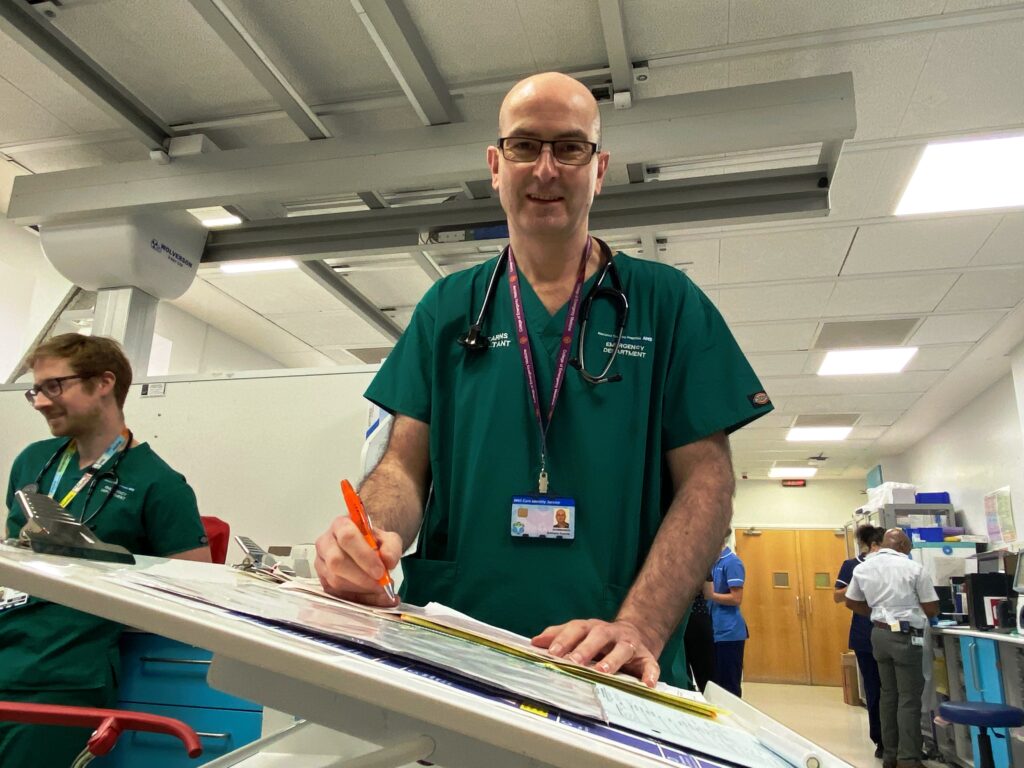
Dr Anthony Kearns in the Resus area of the Emergency Department *Photo taken before Covid-19 restrictions
Emergency Physician and Head of the Emergency Department, Dr Anthony Kearns has been working at Blackpool Victoria Hospital for 13 years in total.
Originally from Staffordshire, he qualified in 2001 and initially wanted to be a surgeon, but later decided to change course.
He has worked in a number of Emergency Departments including Preston, Aintree, Southport, Whiston and Warrington, so brings a wealth of experience and knowledge to Blackpool.
He said: “In the Emergency Department, what we do is tangible; we can make a difference straight away and often get people better quickly which is the upside. The downside is when we can’t do these things for someone and sometimes it isn’t possible to help them.”
“The department sees patients from all walks of life, of all ages and from the entire social economic spectrum. We serve a population of over 300,000 people. We see injury and illness, from stubbed toes and rashes to car crashes and strokes, and everything in between.”
Anthony is one of 15 working as a Consultant in the Emergency Department and collectively it is they who are ultimately responsible for the care of each patient.
Dr Kearns added: “The team here are like a family. We support each other and many staff have formed close relationships. Many people have worked in the department for a long time and there is great camaraderie.
“We are very excited about the new Emergency Village. More than just a new building; it will be a completely new way of doing things with a strong collaboration with all the other specialties, and key input from their particular areas of expertise. We will be able to deliver the right treatment, in the right place, by the right people, as early as possible. This collaborative working will allow us to provide high quality patient treatment and care.”
Blackpool A&E celebrates best ambulance handover performances in North West
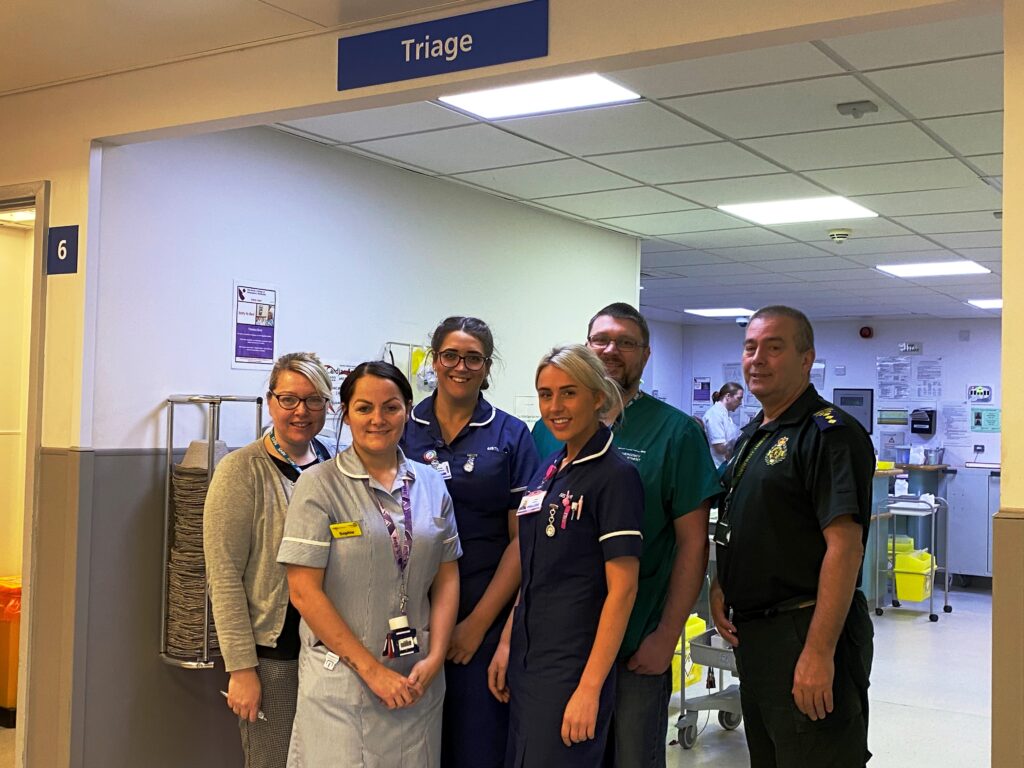
Trust Assistant Directorate Manager in Emergency and Acute Medicine, Tracey Dougall; Trainee Assistant Practitioner, Sophie Jones; Senior Sister, Victoria Williamson; Sister, Chloe Dudley; Consultant, Dr Sam Guest and Hospital Ambulance Liaison Officer, Ian Baines, at Blackpool Victoria Hospital’s Emergency Department
BLACKPOOL Teaching Hospitals NHS Foundation Trust has reduced its ambulance handover times thanks to a special collaboration and a change in practices.
‘Every Minute Matters’ is a collaboration between the North West Ambulance Service (NWAS) and 14 North West emergency departments, with Blackpool Victoria Hospital now in the top three in the North West for reducing this time to free the ambulance for the next emergency, reduce patient waiting times and significantly reducing the delays experienced by patients brought in by ambulance.
Despite being the second busiest Emergency Department (ED) in the North West for ambulances, Blackpool has performed higher than the regional average in January with ambulance turnaround times being an average 28 minutes compared to a regional average of 34 minutes.
NWAS deflection rates (where patients are treated in the community instead of coming to hospital) meant that 27.3% (or 1,109) patients were treated elsewhere other than the ED.
Figures for the first three weeks in February show that Blackpool was the second, third and fourth busiest department in the collaborative but managed to achieve the first, second and third fastest turnaround times. In all three weeks the NWAS deflection rate for the catchment area was greater than the regional average.
Blackpool Victoria Hospital Emergency Department Consultant, Dr Sam Guest, said: “We have changed our processes here at the front end of the department by working better together.
“Ambulance handovers are the time it takes to ‘triage’ a patient where ambulance staff provide critical patient information to hospital staff and the physical transfer of the patient to hospital equipment.
“We have split the ambulance triage and walk in triage into two separate areas, each with its own streaming nurse, with the Triage teams consisting of an ED consultant, senior ED nurse, a triage nurse and a Healthcare Assistant.
“The ambulance crews now have a completed form about the patient on arrival which saves time. Through this new system, we are managing surges better and are consistently faster despite spikes in attendances. This a great start ahead of the upgraded and extended Emergency Village Development that is being planned by the Trust.”
Ian Baines is a Hospital Ambulance Liaison Officer based in Blackpool’s ED.
He said: “The collaborative has really made a difference to the turnaround time which makes the whole system safer and more comfortable for the patients.
“It also helps that the ED team here are brilliant – so friendly and happy – and that makes all the difference.”
The results are so impressive that a number of other Trusts have visited to see the new processes working.
The Trust’s Assistant Directorate Manager in Emergency and Acute Medicine, Tracey Dougall, said: “Our Directorate Manager, Helen Raybould, and I are really pleased with the results from this collaborative work.
“It really has enhanced the patient experience in the Emergency Department and we are really proud of the team.”
Dr Adeline Israel is an Emergency Department (ED) consultant at Blackpool Victoria Hospital and is also the ED lead in the Emergency Village and Critical Care Development.
She qualified as a doctor in India in 2005.
Her motivation for studying Emergency Medicine was when she was 15 years old and she witnessed a car driving off a cliff edge but could do nothing to help the driver.
Feeling so helpless in this situation, she decided to make sure that she could help people in similar situations so set her heart on becoming an emergency doctor.
Adeline qualified from medical school in 2005 and did her post graduate study in Emergency Medicine.
Her career led her to becoming a Medical Director which included establishing emergency services, teaching CPR to the community and helping to change the culture around ambulances showing they were not to be feared but to be seen as a trusted emergency necessity.
Adeline went on to help provide 2,000 ambulances and other essential projects to improve emergency health care in the region of Tamil Nadu in Southern India.
Though she enjoyed her work, she began to miss clinical practice and not many of the hospitals had emergency departments. She aspired to attain Membership and Fellowship from the Royal College of Emergency Medicine which landed her in Oxford in 2016.
On completion, she looked for her first consultant role and applied for a job at Blackpool which she chose because she thought she would be able to really make a change. That was in 2018.
As a consultant, she is one of the 12 most senior doctors within the department. She oversees the treatment of around 200 patients per day.
Last year, it was announced that Blackpool Teaching Hospitals NHS Foundation Trust was to receive close to £13m to develop an “Emergency Village’’ as part of a national fund to upgrade NHS Services in England, subject to successful approval of the full business case.
She said: “I am delighted to be a lead in the Emergency Village and Critical Care Development and that I am trusted to be part of something so important.
“The Emergency Village is not about the building, it is about creating a therapeutic environment for patients and staff. The main thing is about the patients’ journey and how quickly we identify their illness and treat them.”
But there is also a strong message Adeline wants to convey and that is about visitors and behaviour.
She said: “People who should not be in the Emergency Department come because they know they can. A and E does not stand for Anything and Everything. Their arrival just adds pressure to the department and means that someone who really needs emergency care isn’t getting it.
“We find a lot of people swear at us, even when they are sober. We understand that patients get stressed because of the environment, but it is unacceptable to behave in this way towards the people who are trying to help you. Would they speak to the police the same way? Would they like to be treated that way?
She says the staff are the Emergency Department’s greatest asset.
Adeline added: “Our staff are some of the friendliest in the region and we all support one another with words of appreciation. It is a tough job, but the staff always manage to smile and know that what they do on a daily basis makes a massive impact of people’s lives.
“What better job satisfaction can there be?”
July, 2019
Emergency Department set up new streaming service
Visitors to Blackpool Victoria Hospital’s Emergency Department (ED) are being diverted to the correct service thanks to a new streaming service.
Once patients have been booked in by a receptionist on arrival, they are then assessed by a senior nurse and directed to the most suitable department.
The scheme was introduced by ED sister, Jodie Bradford. She said: “I recently introduced the streaming nurse system to try and prevent people being in ED inappropriately and so far we are making an impact.”
Through an assessment, the streaming nurse will direct visitors to Urgent Care (for urgent medical care that is not life-threatening, Ambulatory Care (a service which offers same day emergency care to patients without being admitted to a bed, where possible) or the Emergency Department waiting room where nursing staff can watch for any deterioration in a patient’s condition and be ready to act, ensuring patient safety.
Emergency Department Matron, Sue Roberts, said: “This is an important improvement to patients as they see a nurse at the front door of the ED. This improves the quality and safety of all patients.
Jodie added: “We have had a lot of support for the system from both patients and staff and even from other Trusts. We are also having a positive effect on waiting times within the ED.”
August, 2019
Mental health partnership is a success
A pilot that was introduced to respond to people experiencing mental health crisis between Lancashire Care NHS Foundation Trust, North West Ambulance NHS Service Trust (NWAS) and Lancashire Constabulary is proving to be a huge success in providing the most appropriate care, support and treatment to people.
The pilot, called Psynergy, was launched last December in Blackpool, Fylde and Wyre, and involves a senior mental health nurse from Lancashire Care, a paramedic and a police officer coming together as a crew in a NWAS vehicle to jointly attend to people experiencing a mental health crisis. The aim is to provide people with appropriate triage, offer the right care and advice, improve patient experience and avoid unnecessary hospital admissions.
Since its launch, the Psynergy team has attended 570 incidents, 195 of these only needed advice at the point of contact with only 20 leading to Section 136 detentions under the Mental Health Act. The pilot is also able to support people to remain in their own homes with the right care.
The team triages people on scene and ensures that the most appropriate pathway to support the patient is identified and initiated. The team works seven days a week and operates from 4pm until midnight, a period that NWAS and the police identified as a key time for mental health call outs.
The Psynergy pilot has now received funding from Fylde coast commissioners to continue the service for another twelve months. The Trust will then work with partners to evaluate the pilot and develop a plan to roll this out across Lancashire and South Cumbria as part of an ongoing Mental Health Improvement Plan which is shared between NHS, police and local authorities.
Caroline Donovan, Chief Executive at Lancashire Care NHS Foundation Trust, said:
“We are really pleased that our partnership with Lancashire Constabulary and the North West Ambulance Service is having such a positive impact across Blackpool, Fylde and Wyre. The partnership has been designed so that we can jointly respond and support people who are in mental health crisis.
“This innovative pilot is a great example of joint working and has enabled us to work together with other organisations to develop a joined up approach to working together. The project is a real milestone in changing and improving the way we deliver care and in ensuring that people in the area receive the most appropriate care for their needs. We are really looking forward to seeing this approach grow.”
Pete Hannon, Police Inspector at Lancashire Constabulary, said: “Psynergy is a great example of local partner agencies coming together and working together to the benefit of our local communities. The pilot has been extremely successful in reducing the demand placed on us all, from a police perspective the reduction in Section 136 being carried out frees up valuable police officer hours allowing them to deal with other incidents.
“The real benefits are those afforded to vulnerable members of our community who are now able to receive face to face support from suitably trained officers, something we have not been able to do previously. Another added benefit is the great working relationship partners have been able to develop and these relationships will endure and allow us to work closely in the future to tackle other concerns.”
Mark Lewis, Operations Manager at the North West Ambulance Service, said: “Psynergy has demonstrated how true multi-disciplinary working can have such a positive impact. Increasingly, people in crisis have been defaulting to calling 999 because they don’t know where to turn to; our goal is to give these people the right care, at the right time and in the right place, every time. The team rapidly assesses their needs, if they need treatment at hospital then that is provided without delay, but for so many we have exactly the professionals on the vehicle to help them right where they are. There are many services and charities available and the Psynergy Team helps them access these too.”
Head of Department for Emergency Medicine at Blackpool Teaching Hospitals NHS Foundation Trust, Dr Anthony Kearns, said: “The scheme ensures already vulnerable mental health patients don’t have to attend the Emergency Department to access their mental health care. This is beneficial to both the patient and the department.”

